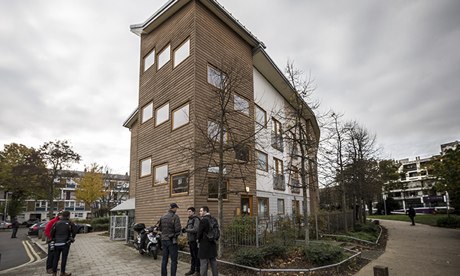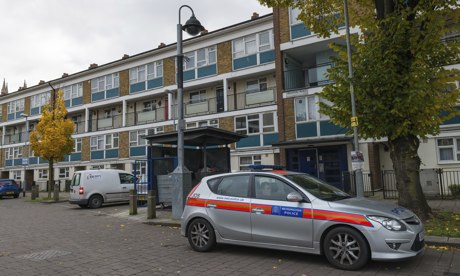Aravindan Balakrishnan, aka Comrade Bala, ran separatist party-cum-commune from bookshop in Brixton, south London

Peckford Place in Brixton, where Aravindan and Chanda Balakrishnan were arrested on suspicion of holding three woman captive. Photograph: Guy Corbishley/Demotix/Corbis
The 73-year-old man arrested on suspicion of holding three women captive in a south London flat for 30 years is a one-time Maoist activist who was well known within far-left circles in London during the mid- and late 1970s as the leader of a separatist party-cum-commune.
Aravindan Balakrishnan, known as Comrade Bala, had been a senior member of the Communist party of England (Marxist-Leninist) and a member of the party's central committee‚ but according to a history of the movement he split from the Maoist party in 1974.
His new organisation, described in one account as being "characterised by the ultra-left posturing and Mao worship", was called the Workers' Institute of Marxism-Leninism-Mao Zedong Thought. But the group is not thought to have been active since the 1970s ‚ before one of the women, now aged 30, was born.
Local sources said the woman arrested last week was his wife Chanda Balakrishnan, aged 67, a fellow activist, known during her party days as Comrade Chanda. They were both arrested last week on suspicion of holding three woman captive in a cult-type arrangement at a series of addresses in south London, including most recently at Peckford Place in Brixton. Both have since been released on police bail.
The women have been described by police as a 69-year-old Malaysian, a 57-year-old Irishwoman and a 30-year-old Briton, believed to be the daughter of the Irishwoman and Aravindan Balakrishnan. On Monday night, police issued a clarification confirming that the man arrested is 73, not 67 as previously claimed.
Balakrishnan, who came to the UK from Malaysia, was formally expelled from the Communist party of England, which also no longer exists, due to "conspiratorial and splittist activities", according to a party statement of the time. He formed his own group, and in 1976 opened a bookshop, community centre and commune in Acre Lane, Brixton, at the time still a deprived area. The group's own manifesto described itself as multiracial, with women taking a leading role.
While some reports say the organisation was based as a squat, reports from the time say Balakrishnan's group took out a long lease on the building. The handful of business owners on the road who remember the centre say it was always busy, with large numbers of young people coming in and out of the large, three-storey Victorian corner property at all hours.
Balakrishnan's beliefs, niche even among the ultra-left groups of the time, styled his group as a direct component of Maoist China, calling on the Red army to come to south London to liberate working people. Members carried portraits of Mao.
The Acre Lane building was also run in part as a shrine and memorial to the Chinese communist leader, who died that year.
The manifesto from the group, reproduced on the internet, described it as "a workers' centre, library and bookshop", adding: "Thousands of people, in particular the poorer working people in the area, began to visit and use the centre. Already two years before the centre was established our comrades had begun to boldly arouse the people of Brixton with the proletarian revolutionary line of beloved Chairman Mao."
The group's beliefs were regularly mocked in the diary column of the Times newspaper, bringing speculation that it became the part-model for the Tooting Popular Front, the ludicrous political movement set up by Robert Lindsay in Citizen Smith, a BBC sitcom that began broadcasting in 1977.
According to another history of far-left groups in the period, the Acre Lane community was broken up in March 1978 following a police raid. A total of 14 people were arrested, including six female commune members, according to reports from the time. Balakrishnan was among those held, along with his wife, referred to in reports only as Comrade Chanda.
The owner of a DIY shop adjoining the former Maoist centre‚ now an Algerian restaurant‚ said his father used to own the building in question, but sold it shortly before Balakrishnan's commune opened in 1976. The shop owner, who wished to remain anonymous, said he was told Balakrishnan's group took out a long lease on the building, which would have cost a significant sum of money, and there was speculation as to how they raised the money. Police car in Peckford Place in Brixton where the women were allegedly held. Photograph: Velar Grant/ Velar Grant/Demotix/Corbis
Police car in Peckford Place in Brixton where the women were allegedly held. Photograph: Velar Grant/ Velar Grant/Demotix/Corbis
 Police car in Peckford Place in Brixton where the women were allegedly held. Photograph: Velar Grant/ Velar Grant/Demotix/Corbis
Police car in Peckford Place in Brixton where the women were allegedly held. Photograph: Velar Grant/ Velar Grant/Demotix/Corbis
The man said: "There was always lots of young people going in and out of the building, but they were never any trouble."
Rev Bob Nind, who was the vicar of St Matthew's church in Brixton and a well-known community figure at the time, said he went to the Maoist group's centre once, and also knew of them by reputation. "The place itself didn't see that remarkable. It mainly looked like a bookshop," he told the Guardian. "There were a lot of young people around, including a lot of women. There was a lot of literature connected to Mao."
Nind said that by reputation, Balkrishnan's group was known as the most far-left even among the many Marxist-linked groups in the area at the time. "There were a lot of leftwing groups active. I remember very well that at the 1978 byelection after Marcus Lipton died, there were 10 candidates and five were to the left of Labour. But even among these, the people from Acre Lane were known as being particularly doctrinaire, and quite centralist."
Nind said he never met Balakrishnan but knew of "Comrade Bala", and was told he was considered a "dominant force" within his organisation.
After leaving the Acre Lane centre it seems the couple lived at more than a dozen addresses around south London, most lately Peckford Place, in Angell Town, north of Brixton. One of the longer-used properties is believed to be a Victorian house in Herne Hill, adjoining Brixton. Electoral records show a Chanda Balakrishnan living at the address from 1998 to 2004, though Aravindan Balakrishnan is not listed.
Prof Steve Rayner, now head of Oxford University's institute for science, innovation and society, studied Balakrishnan's group in the late 1970s, and noted the leader's "superior ability to manipulate" other members, despite the supposed non-hierarchical structure. Rayner's report made it clear the group had elements of a cult, calling it the "clearest case of far-left millenarianism which I have encountered".
The group had about 25 members, who in 1977 "confidently predicted" they would be liberated by the Red army by the end of the year, the report said. In all, 13 people lived at the Acre Lane centre, with a few having outside jobs but handing all their earnings to the group. The centre's location was chosen because it was seen as "the worst place in the world", Rayner's report said.
Despite very regular meetings, there was very little apparent debate and most of the discussion seemed to be people parroting Mao texts, he wrote, adding: "The members are required to witness their beliefs at all times. They talk of little else and are rarely to be seen without their prominent Mao badges."
Speaking on Monday, Rayner recounted the group was tiny and tight-knit, and "clearly under the spell of their leader, 'Comrade' Balakrishnan".
He added: "Their membership was overwhelmingly overseas in origin. Most were foreign students who seemed to have difficulty adjusting to life in the UK. They refused to recognise the legitimacy of the state and maintained a hostile attitude towards the establishment and towards the rest of the far-left in Britain at that time. Their ideology was profoundly detached from reality."
In a statement Lambeth Council said: "Lambeth Council worked closely with the police in the weeks leading up to the three women leaving the house and continues to do everything to assist with the police investigation.
"This is an extremely complex case involving a number of individuals going back decades. It is too early at this stage to provide the detail of any contact we may have had with them.
"Lambeth is committed to openness and transparency and we will provide further information in due course.However we do not want to prejudice the ongoing police investigation. Right now the security, confidentiality and well-being of those involved is paramount."
No comments:
Post a Comment